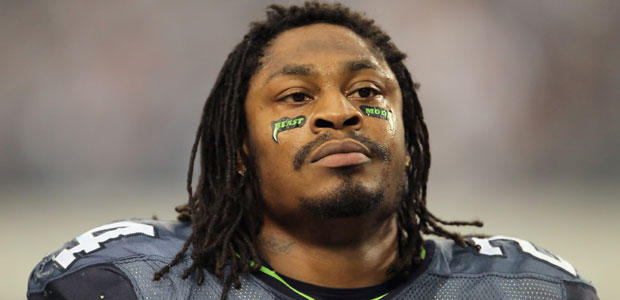Something that’s been comparatively underdiscussed in the debate over Marshawn Lynch’s media appearances at the Super Bowl is how the NFL’s standards compare to other leagues. There are a lot of NFL writers upset that Lynch hasn’t given them meaningful answers this week, and given the typical NFL media policies that force every athlete to talk to the media when requested, that’s somewhat understandable. However, as Joshua Robinson of The Wall Street Journal notes, even Lynch’s reticence is more than most top English soccer players offer:
The policy across the big four American sports is that all players must talk to reporters at least some of the time. It can be at practice or in the locker room after a game. The Premier League has no such requirement—after all, practices are essentially closed and beat writers never see the inside of a locker room. …
Some Premier League clubs offer postgame mixed zones to a handful of reporters, which replicates the huddle-around-a-guy’s-locker dynamic. But the number of players who stop for a chat is so small, the beat writers often pool their interviews and impose their own embargoes—agreed upon with the team—to make sure they have enough fresh material to get to the next game.
This is all by design. Because what’s in it for the players? Sergio Agüero and Alexis Sánchez ’s images don’t suffer when they don’t talk to newspapers. And they cooperate for television interviews in Europe because they have to. Plus, they know that television is paying for the whole show. The Premier League’s most recent rights deal with cable broadcaster Sky Sports, for instance, was worth more than $2 billion.
That piece is rather destructive to the NFL media’s narrative that print media articles with players’ quotes are essential to selling the sport. That certainly doesn’t appear to be the case in the Premier League. This has been the case for a while; Christopher Davies wrote a very interesting piece for the Football (soccer) Writers’ Association in August 2013 (via Roy Greenslade of The Guardian) about access to top soccer players pales by comparison to what NFL writers get:
In England, apart from some local newspapers, there is little or no daily contact with managers and particularly players. Generally speaking, the day before a Barclays Premier League game the manager and perhaps one player will attend a press conference. In the NFL, each club must open their locker room during the week on Monday, Wednesday, Thursday and Friday – Tuesday is treated as a players’ day off – to all accredited media for player interviews for a minimum – yes minimum – of 45 minutes. This is required under League rules and is in their contracts. It is not permissible for any group of players to boycott the media. Star players must be available at least once during the week.
All NFL players are also required to participate in weekly conference calls with the media from the opposing team’s city, though no player is required to do more than five such sessions in the regular season.
In addition to holding a news conference after every game, the head coach must be available on a regular basis to the media that regularly cover the team – at a minimum on four days. …
The NFL see the media as a valuable outlet to sell their product. Their policy states: “Cooperation with the news media is essential to the continuing popularity and financial prosperity of our game and its players. This is an important part of your job, especially in these challenging times when everyone in the NFL must do more to promote our game.” …
As footballwriters.co.uk has highlighted many times, English clubs ban reporters for the most ridiculous of reasons, not least for printing an injury story that is 100 per cent accurate, but which the manager would rather have been kept quiet. This cannot happen in the NFL as the League insist that clubs must ensure that all medical information issued to the media is credible, responsible, and specific in terms that are meaningful to teams, media, and fans. The NFL believe that their injury reporting policy relates directly to the integrity of the game, and club management, in consultation with its medical staff, is responsible for the accuracy and appropriateness of medical information that is distributed in response to public interest.
None of this is to argue that the NFL should go to the Premier League’s model. There’s a lot of good that comes from the amount of access NFL media have to players, and that shouldn’t be taken lightly. However, in the wake of the complaints about Lynch, it’s worth considering just how much worse so many other reporters have it. Other media members still seem to be able to find a way to make it work without the levels of access NFL reporters claim to need, though. Lynch’s behaviour has definitely made it harder than usual for NFL reporters this week, and it’s understandable why many are upset about that. However, the case of the Premier League illustrates that it could always be much worse.








Comments are closed.